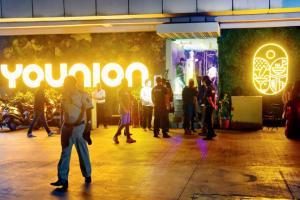Does a nightlife experiment make sense when Bombay hasn't figured out how to cope with daylight yet?

This experiment is great for people who have the luxury of stepping out at 2 am for masala dosa. File pic
 It's been a couple of weeks since our government cleared the decks for what it refers to as a 'nightlife experiment', allowing eateries, shops, and theatres in malls and mill compounds to stay open at all hours. If you haven't heard of it yet, I predict the launch of a big-budget marketing campaign any day now.
It's been a couple of weeks since our government cleared the decks for what it refers to as a 'nightlife experiment', allowing eateries, shops, and theatres in malls and mill compounds to stay open at all hours. If you haven't heard of it yet, I predict the launch of a big-budget marketing campaign any day now.
ADVERTISEMENT
This sounds like a great idea on paper, obviously, because it allows our ministers to talk about how Bombay is a vibrant city that never sleeps. There are obviously some people who will benefit too; the ones who step out of the airport at 3 am, perhaps, or those who stumble out of bars at 1.30 am. At the risk of sounding like a party pooper though, I wish the government would pay a little more attention to how Bombay manages when the sun is still out.
It's hard to look at this city with a dispassionate eye and declare that things function efficiently during our regular working hours. Think of what a first-time visitor must go through, from the minute he or she steps off a bus, train, or airplane, and begins the excruciating task of getting somewhere using any form of public transport. Think of the seemingly simple act of finding a rickshaw or cab, taking a local train at 9 am, or getting a bus from one end of the city to the other. These are things all '24x7 vibrant cities' the world over take for granted. Ask yourself if anyone in Bombay can.
Maybe the problem lies with how we think a city that never sleeps ought to be like, or how we evaluate the pros and cons of belonging to such a city. Yes, there will always be some people grateful for the opportunity to find a meal in the wee hours, but anyone who has lived here long enough will know that you can always eat at any hour of the night if you know where to look. There have always been eateries of all kinds open to those who have the capacity to pay the right kind of bribe. Ask anyone familiar with Juhu for proof.
There is also something to be said for silence, and the benefits of living in a place that offers us some. The World Health Organization has tracked noise levels for over a decade and recently described noise pollution as an underestimated threat that contributed not just to hearing loss but also to dementia, cardiovascular disease, stress and high blood pressure, pegging the monetary cost at over $58 billion for Europe alone. If one accepts the easily verifiable fact that India is a lot noisier than Europe can ever be, one can only imagine what millions of us have been forced to deal with for years, for no fault of our own. In this city that rarely allows us to escape the cacophony of daylight, we have introduced a nightlife experiment.
A few years ago, the Tourist Board of Finland launched a marketing campaign called 'Silence, Please', treating silence as a resource that could be promoted like their country's clean water or wild produce. The campaign was based on their premise that the experience of silence would be something that people would one day be prepared to pay for. I like to compare that train of thought with what we choose to market. What message are we trying to send, when we talk about coastal roads for more automobiles, all-night theatres, or eateries for those who choose to eat instead of sleep?
The government of Maharashtra probably means well, and businesses that choose to invest in resources may or may not benefit financially from these changes. It would still be nice to think about the millions who engage with Bombay by dawn, rather than the hundreds who step out at dusk.
This experiment is great for people who have the luxury of stepping out at 2 am for masala dosa, or those desperate to watch the latest sequel to Star Wars at 4 am. For the rest of us, those are usually the hours spent on recovery, when we try and forget what we have been through, and try our best to gather strength for the struggle that begins anew the next morning. It is only when governments start to focus on basics like infrastructure, public transport, and public health, that we can turn into a 24x7 city that matters. Until then, these moves can only be regarded as exercises in public relations.
When he isn't ranting about all things Mumbai, Lindsay Pereira can be almost sweet. He tweets @lindsaypereira Send your feedback to mailbag@mid-day.com
The views expressed in this column are the individual's and don't represent those of the paper
Catch up on all the latest Crime, National, International and Hatke news here. Also download the new mid-day Android and iOS apps to get latest updates
 Subscribe today by clicking the link and stay updated with the latest news!" Click here!
Subscribe today by clicking the link and stay updated with the latest news!" Click here!






